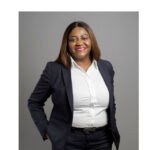‘ I BELIEVE I BELONG TO ANY ROOM THATALIGNS TO MY PURPOSE, WHERE I CAN ADDVALUE AND BRING TRANSFORMATION’- IKOSA
IWIB: Thank you so much for doing this with us! Before we dig in, our readers would like to get to know you a bit more. Can you tell us a bit about your childhood “backstory”?
I was born in Windhoek, 40 years ago. I grew up in Katutura (contrary to what many might believe). I attended primary and secondary school in Windhoek and went to Cape Town for my tertiary education.
IWIB: Can you tell us the story about what led you to this particular career path?
I remember watching television and I saw the then public relations manager of the City of Windhoek, Mr Joshua Amukugo speaking. I was intrigued by his title, so I decided to go and interview him. By then there was no Google, so I had to go in person and ask him questions about his role. After the interview, I knew right then that is what I wanted to study.
During that time there was no specific course for Public Relations. UNAM had media studies, but that was not what I wanted to study. I found a three-year diploma course designed by the Public Relations Institute of Southern Africa that directly dealt with Public Relations in Cape Town. I applied and finished my course. I then enrolled for my degree at the Cape Peninsula University of Technology, then continued with my master’s degree in Public Relations Management. Whilst studying in Cape Town, I participated in numerous internship opportunities, which led me to work with brands like Old Mutual, the Cape Town Jazz Festival, British Tobacco, and Virgin Active. In Windhoek, I was the first PR intern at the Namibian Breweries.
IWIB: Please share the most interesting story that happened to you since you began your career?
I believe that if you want something, you must go and get it. When I came back from Cape Town, whilst landing at Hosea Kutato Airport, I saw a billboard written Cell One. It was the first time I saw that brand. I decided that I would work there. When I got home, I wrote a proposal to the PR manager then, (Rejoice Itembu), telling her the skills set I had and the value I could offer to their new brand. The day I went to give the proposal, she was not there. Someone said they would give it to her. I am not sure she ever got it. Although I never worked at Cell One, I managed to work at other prominent brands, using the same strategy. I know sometimes we wait for job applications before we can apply, however, it is worth the risk to just put yourself out there. You never know who needs your skills. I have been blessed to work at companies I wanted to work for. I am also blessed to work in positions that are aligned with what I studied.
IWIB: Which three-character traits do you think were most instrumental to your success? Can you please share a story or example for each (if you have any)?
Bravery- I am not easily intimidated. I believe I belong to any room that aligns to my purpose, where I can add value and bring transformation. I believe anything is possible. I remember I went with work to represent Namibia in Malawi at an Africa Child Online Protection Conference. Namibia was not on the programme to present. I was fighting flu symptoms, and I was probably six months pregnant, so I could not take strong medication. However, I would not sit and listen to how other countries were bragging about what they were doing in their countries when I knew that Namibia has some of the best interventions in Africa in protecting children online. So, I spoke to the organisers to squeeze me on the programme and showed her why Namibia deserves to present.
The other traits are discipline and focus. I learned to feed my dreams and starve my distractions.
IWIB: Ok, thank you for that. Let’s now jump to the primary focus of our interview. Can you help articulate a few of the biggest obstacles or challenges you’ve had to overcome while working in a male-dominated industry?
In an attempt for men to put women “in their place”, they hold you hostage to so-called feminine attributes that have been defined by society, to make women submissive and submerged. Since I did not always fit the “nice submissive girl” mold, I get called a feminist, or aggressive, when I am being stern.
I overcame this by not accepting negative labels disguised as subtle emotional abuse. I know who I am, and what I represent. I do not allow people to define who I should be. God has already done that for me.
Another challenge is being used as a scapegoat to protect the “gentlemen’s club”. Men protect each other, even when there is clear misconduct, unlike women who throw each other to “wolves”. In such instances, it is important to know your company policies, guidelines and procedures and use them to protect yourself, when you need them to. I have learned to document everything because verbal communication can be refuted when it matters. I also experienced sexual harassment; I reported it and it alerted the male manager that what he tried to do was unwelcome and unacceptable. Since then, whenever I met with that male manager, he showed me respect and courtesy.
IWIB: Can you share a few of the things you have done to gain acceptance among your male peers and the general work community?
Doing my work with excellence. Having subject knowledge of the areas I am dealing with and not allowing myself to be bullied.
In life you need to choose whether you will be a victim or a victor. Perspective matters. People will address you the way you address yourself.
IWIB: Based on your opinion and experience, what are the “Things You Need To Thrive and Succeed as a Woman In a Male-Dominated Industry?”
• You need to know who you are. Your identity needs to be anchored in God, not people’s opinions of you.
• You are not your male colleague’s mother, sister, wife or girlfriend. You don’t need to play those roles at work. I have seen over the years how fellow female colleagues do things for their male colleagues that their wives are supposed to be doing. Another example is when you are in the boardroom and it is time for a coffee break, I would see female colleagues standing up to serve water or make coffee for the seated male colleagues, who are sometimes at the same job level as the female colleagues.Don’t get me wrong, I believe you can and should serve your team members, but within boundaries. Many African cultures have conditioned women to submit to men, however, the author of submission, God, in His holy scriptures, said: “Wives be submissive to your own husbands as unto the Lord” (Ephesians 5:22-23).\
• Your male supervisor/boss is not your father. Sometimes women take on the role of a daughter at work and treat their male bosses as their fathers, which can have adverse effects in the future.
• Leave the male attributes for the men. You are a female, embrace your feminine traits. They bring a different perspective to the boardroom and the workplace. Stop acting like you are a man, especially women who are in senior leadership roles. There are already many males in leadership positions, we need women to embrace their nurturing, empathetic, intuitive attributes that can enrich organizational cultures.
• You do not go to work to make friends. If you find some, that is great. Know that you go to work to fulfil a set of objectives and goals. Stay focused on the goal, and don’t get embroiled in office gossip and politics.
• Don’t use emotions to blackmail your male colleagues. You can only use them for a while and after that, you create negative rapport and lose your colleague’s respect. Acknowledge your emotions, but find ways to manage them.
IWIB:Why is there a push to get women in male dominated industries and not a push to get men in women dominated industries?
Because women while growing up were restricted to certain roles. Society dictated where they should work. Now more opportunities are opening up for women. Men will not go in roles deemed feminine.
IWIB:Why is there a need for women in male-dominated industries?
Yes, femininity is a gift to the world. It brings balance to many board rooms. It just needs to be healthy femininity. Toxic femininity is on the rise, as more women, especially in leadership feel insecure and feel misplaced in the male-dominated world.







